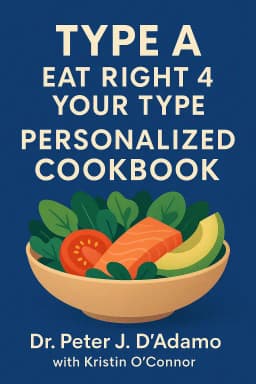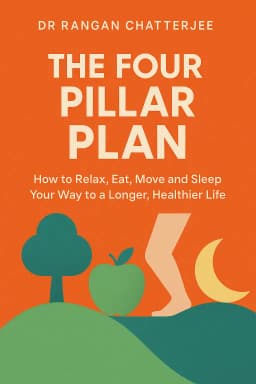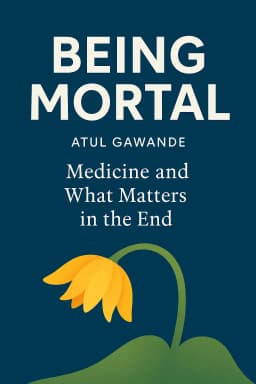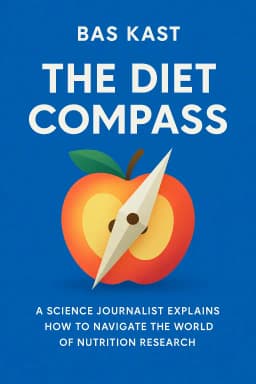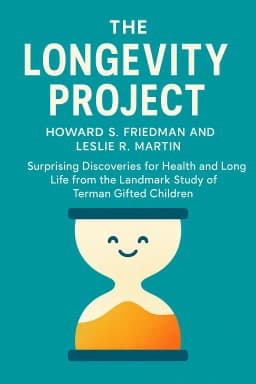
Why Planners Outlive Partiers
Surprising Discoveries for Health and Long Life from the Landmark Study That Followed 1500 People from Childhood to Old Age
Golden Hook & Introduction
SECTION
Laura: Alright, Sophia, pop quiz. Who lives longer: the cheerful, optimistic life-of-the-party, or the slightly-neurotic, persistent person who plans everything? Sophia: Oh, that’s easy. The happy one, obviously. Every piece of health advice for the last twenty years has been about positive thinking, gratitude journals, and just being cheerful. The planner is probably stressed out, which we all know is terrible for you. Laura: That’s what I would have thought too. But an incredible 80-year study says you’re dead wrong. And the real answer will completely change how you look at your own habits, your friends, and maybe even your career. Sophia: Dead wrong? Okay, I'm hooked. You can't just drop a bomb like that and walk away. What is this study? Laura: It’s all in the book we’re diving into today: The Longevity Project: Surprising Discoveries for Health and Long Life by Howard S. Friedman and Leslie R. Martin. And what's incredible is this isn't just another health book. It's the result of a 20-year analysis of one of the longest and most famous studies in history. Sophia: Which one? Laura: The Terman study. It started tracking 1,500 gifted kids way back in 1921. These authors, both highly respected psychologists, essentially inherited this absolute goldmine of data spanning nearly a century of life. Sophia: Whoa. So this isn't based on a two-week survey asking people if they eat kale. This is tracking people's entire lives, from childhood to the grave. Laura: Exactly. It’s the ultimate long game. And the very first thing they found completely upends what we all think about personality and health.
The Conscientiousness Advantage: Why Prudence Beats Cheerfulness
SECTION
Laura: The single biggest personality predictor of a long life wasn't optimism. It wasn't being agreeable or sociable. It was conscientiousness. Sophia: Hold on, what does 'conscientious' even mean in this context? Is it just being a neat freak or someone who's always on time? Because that sounds… well, a little boring. Laura: It’s so much more than that. The book defines it as being prudent, persistent, organized, and responsible. Think of it as the person who follows through, who is dependable, who doesn't just make plans but actually sticks to them. They have a kind of life-long diligence. Sophia: Okay, I need an example. Give me a person. Laura: Perfect. Let’s talk about a Terman participant the book calls Patricia. When she was assessed in 1940 as a young adult, her results were fascinating. She described herself as thrifty, persistent, and detail-oriented. She said she enjoyed planning her work in detail and was careful about her responsibilities. She wasn't impulsive. She wasn't the wild, spontaneous type. Sophia: She sounds like the person you’d want managing your retirement fund, not necessarily the person you'd invite to a last-minute road trip. Laura: Exactly! But here’s the punchline: by the end of the 20th century, Patricia was among the Terman participants who had lived the longest. The unconscientious, impulsive ones? They had died in much larger numbers, and much earlier. Sophia: Wow. But is that just because they're less likely to do obviously risky things? You know, they probably don't smoke, they wear their seatbelts, they don't take up base jumping. Is it that simple? Laura: That's part of it, for sure. Conscientious people are less likely to engage in risky behaviors. But the book argues it goes much deeper, and this is where it gets really interesting. There are three hidden reasons. First, there might be a biological link. Some research suggests conscientious people may have different brain chemistry, maybe higher levels of serotonin, which influences both prudence and overall health. Sophia: Okay, so it could be partly hardwired. What's the second reason? Laura: They gravitate towards healthier situations and relationships. A conscientious person is more likely to end up in a stable marriage, have supportive friends, and choose a healthier, more stable work environment. They don't just avoid individual risks; they build an entire life that is less risky and more supportive. Sophia: That makes so much sense. It's like having a good internal project manager for your own life. You're not just managing tasks, you're managing the whole project of your well-being. It’s a system, not a single choice. Laura: Precisely. And the third reason is that this trait is powerful enough to overcome other disadvantages. Even conscientious people from difficult childhoods, like those who experienced parental divorce, were able to build these healthy pathways for themselves and live long lives. It's a trait that helps you self-correct. Sophia: So it's less about avoiding danger and more about actively building a life that's fundamentally more stable and resilient. This flips the script on the whole "live in the moment" philosophy we hear so much about. Laura: It really does. The book shows that while living in the moment can be joyful, living with a plan for the future is what actually extends that future.
The Social Paradox: Why Being a Social Butterfly Can Be a Double-Edged Sword
SECTION
Sophia: That makes a strange kind of sense for conscientiousness. But what about being social? Every health guru, every article, every podcast says social connection is the absolute key to a long life. Surely the popular kids, the social butterflies, lived longer? Laura: You would think so, and this is one of the book's most startling findings. The answer is actually no. Sociability, they found, is a double-edged sword. Sophia: Come on. How can being popular be bad for you? Laura: Let's look at a participant the book calls Paul. As a kid, he was the definition of popular. His teacher described him as well-liked, optimistic, and more interested in social activities than his lessons. He was energetic, a leader, the kid everyone wanted to be around. Sophia: Sounds like a future CEO or politician. A classic extrovert. Laura: You'd think so. But the data showed that, overall, childhood sociability had no correlation with a longer life. Some sociable kids like Paul died young, while others lived to old age. It was a wash. And when the researchers dug into why, they found that sociable people are often exposed to more health risks. Sophia: What kind of risks? Laura: Think about it. Who is more likely to be at a party where there's heavy drinking? Who is more likely to start smoking because their friends are? The study found that the sociable Terman kids grew up to drink more and smoke more over the decades. Their social networks, while providing connection, also provided peer pressure and access to unhealthy habits. Sophia: That is a fantastic point. Your social life can be a vector for good habits or for bad ones. I never thought of it that way. Laura: And here's the kicker that really drives it home. Terman did a sub-study comparing the careers of his participants. He found that the men who became scientists and engineers were, as a group, far less sociable than the men who became businessmen, lawyers, and salesmen. They were shyer, less interested in social clubs, more solitary. Sophia: Okay, but who lived longer? Laura: The scientists. Significantly longer. Sophia: Wait, so being an introvert who loves their work is healthier than being a back-slapping, deal-making salesman? That goes against everything we're told about networking and being a "people person." Laura: It does! And the book is clear: this doesn't mean being a hermit is the goal. The key isn't about being popular or being liked. It’s about the nature of your social ties. And this leads to another profound finding: the most protective aspect of social life wasn't receiving support, but giving it. Sophia: Giving support? Laura: Yes. People who were actively involved in helping others—friends, neighbors, their community—lived longer. They use the example of a woman named Barbara, a social worker who was constantly organizing community projects and helping friends. Her life was integrated with others in a meaningful, productive way. Sophia: So it's not about the number of Instagram followers you have or how many people show up to your birthday party. It's about who you are actually showing up for in the real world. It’s about contribution, not popularity. Laura: Exactly. It’s about being a vital part of a community, not just the center of attention. That’s the kind of social connection that fosters a long life.
The Myth of 'For the Kids' & The Power of Work
SECTION
Laura: And that idea of 'showing up' and building stable structures brings us to the two biggest arenas of life: family and work. And the findings here are, if anything, even more shocking. Sophia: I'm bracing myself. What did they find? Laura: Let's start with family. The study looked at the long-term effects of childhood trauma, and one event stood out with terrifying clarity. The single strongest social predictor of early death in adulthood was parental divorce. Sophia: Wow. Stronger than other factors? Laura: Much stronger. On average, the children of divorced parents in the study died almost five years earlier than the children from intact families. And this was specifically divorce—the death of a parent did not carry the same risk. Sophia: Five years? That's a staggering amount of life. That's more than the penalty for moderate smoking or drinking, isn't it? That's just devastating. Why was it so damaging? Laura: The book suggests it's a cascade of negative effects. It’s not just the emotional trauma. Children of divorce in that era were more likely to have lower educational attainment, they were more likely to smoke and drink heavily themselves, and crucially, they were much more likely to get divorced themselves as adults, which compounded the health risk. It sets them on a fundamentally less stable life pathway. Sophia: It’s a ripple effect across their entire life. The story of Donna, whose parents' divorce seemed to set her on a path of one health threat after another, is just heartbreaking. It makes you rethink the whole idea of "staying together for the kids." The book says that's not always a good idea if the home is full of conflict, right? Laura: Exactly. A distressed, high-conflict home can be just as damaging. The core issue is the lack of a stable, secure foundation. But here's the fascinating counterpoint. If an unstable home is one of the biggest risks, what's one of the biggest protectors? Sophia: Let me guess, based on what we've discussed. A stable, meaningful job? Laura: You got it. This completely busts the modern myth that you should avoid stress and that a high-pressure job will kill you. The Terman study found the opposite. The participants with the most career success—the ones who worked hard, were persistent, and achieved a lot—were the least likely to die young. Sophia: So the hard-driving executive isn't necessarily on a path to a heart attack? Laura: Not at all. In fact, the most successful men in the study lived, on average, five years longer than the least successful men. Think of someone like Norris Bradbury, who took over from Oppenheimer at Los Alamos during the Cold War. The pressure was immense, but he was engaged, productive, and had a strong sense of purpose. He lived to be eighty-eight. Sophia: So the key isn't avoiding stress, but finding the right kind of stress? The stress that comes from meaningful challenge, not from chaos or interpersonal conflict. Laura: That's the perfect way to put it. The book makes it clear that workplace stress from interpersonal conflict—a bad boss, toxic colleagues—is damaging. But the stress that comes from being deeply engaged in challenging, meaningful work is life-affirming. It's a form of productive engagement. Sophia: So a chaotic, unstable home life is catastrophic, but a stable, challenging work life is protective. The theme here seems to be about finding a meaningful, persistent path and sticking to it, whether in your habits, your relationships, or your career. Laura: That is the absolute core of it. It's all about the path.
Synthesis & Takeaways
SECTION
Laura: When you pull it all together, the book's ultimate message is that there is no magic pill for longevity. There's no single food, no single exercise, no single mantra. It’s not about these one-off choices we obsess over. It's about the entire pathway you create for yourself over a lifetime. Sophia: It’s a total paradigm shift. We’re so focused on quick fixes—a 30-day diet, a weekend retreat to "de-stress." But this research says that's all just noise. The real work is slow, steady, and happens over decades. Laura: Exactly. It’s the person who, day in and day out, is prudent, reliable, and persistent. It’s the person who builds deep, meaningful, and helpful relationships, not just a wide social circle. It’s the person who finds a career that challenges and engages them, and they stick with it. They are building a healthy life, brick by brick. Sophia: It makes you stop and think... are my daily habits building a healthy pathway, or am I just chasing short-term happiness? The question the book leaves you with is so much deeper than 'what should I do today?' It's 'who am I becoming over the next few decades?' Laura: It's a powerful question. And it’s one that’s a lot more empowering than just following a list of rules, because it puts the power back in our hands to shape our own path. Sophia: I love that. It feels less like a prescription and more like a philosophy for living. Laura: We'd love to hear what you all think. Which of these findings surprised you the most? The idea that cheerfulness isn't a protector, or that divorce can have such a long shadow? Let us know on our socials and join the conversation. Sophia: This is Aibrary, signing off.
